
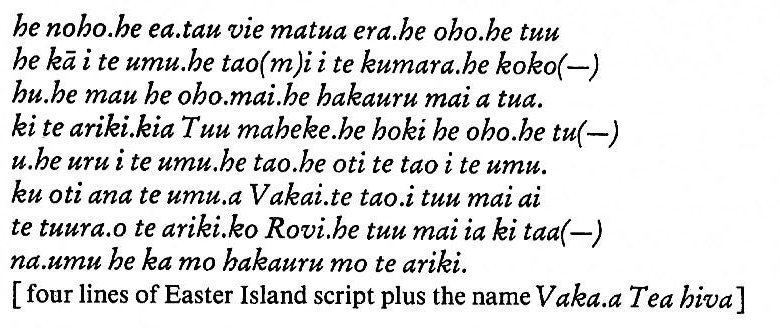
| te ingoa
o te maara noho o te ariki.o Hotu.ko oro(-) |
The name of the residence (maara
noho) of the king, of Hotu, was Oromanga. The name
of the place where the roof of the house had been
covered [hidden, kona] by Nuku Kehu was Hare Topa
(sic!) Tuu. |
| manga.te
ingoa o te kona era i hatuu
era i te hare. |
| e Nuku
kehu.ko hare topa tuu. |
| The expressions Tonga,
Kona, Toa (Sam., Haw., Tah.), to indicate
the quarter of an island or of the wind, between the
south and west, and Tokelau, Toerau,
Koolau (Sam., Haw., Tah.), to indicate the opposite
directions from north to east - expressions universal
throughout Polynesia, and but little modified by
subsequent local circumstances - point strongly to a
former habitat in lands where the regular monsoons
prevailed. Etymologically 'Tonga', 'Kona',
contracted from 'To-anga' or 'Ko-ana',
signifies 'the setting', seil. of the sun. 'Toke-lau',
of which the other forms are merely dialectical
variations, signifies 'the cold, chilly sea'. Fornander. |
|
Four lines of Easter Island script plus the name
Vaka.a Tea hiva:
= segments from Br10 and Br9 and two doubtful lines (The
Eighth Land, p. 290.) |
| he maro
tokoa te mee.a Nuku Kehu.i tuki.mai |
Nuku Kehu was also in charge
of the feather garlands (maro), which served to
mark the boundaries of the royal residence. He had
pounded (the staffs with the feather garlands) into the
ground [he maro tokoa te
mee.a Nuku Kehu.i tuki.mai].
The middle (te tini) was located in front of
the bay of Hanga Rau [te
tini o mua i te hanga.o hanga rau]. The
feather garlands went up, continued, and reached Puku
Parari [i iri ai te
maro.i oho.ai.he tuu ki puku parari]. They
went up again and reached Puku O Heha [he
iri hokoou he tuu.ki puku o heha].
From Puku O Heha they formed (a line) to the side, to
Aro Huri [i hakataha
hokoou ai ka aro huri]. From Aro Huri they
turned again toward the sea [i
hoki hokoou ai.a tai] and reached Maunga Koua
[he tuu ki maunga koua],
went down, went their way, and reached Hira Moko [he
turu he oho.he tuu ki hira moko]. (He) made a
second line (? he rua
taupa) of feather garlands. |
| te tini
o mua i te hanga.o hanga rau.i iri ai te maro. |
| i
oho.ai.he tuu ki puku parari.he iri hokoou he tuu. |
| ki puku
o heha.mai puku o heha.i hakataha hokoou |
| ai ka
aro huri mai aro huri i hoki hokoou ai.a tai |
| he tuu
ki maunga koua he turu he oho.he tuu ki hira |
| moko.he
rua taupa o te maro. |
|
Pa.1. Mgv.:
pa, an inclosure, a fenced place. Ta.: pa,
inclosure, fortification. Mq.: pa, inclosure.
Sa.: pa, a wall. Ma.: pa, a fort. 2. Mgv.:
pa, to touch. Sa.: pa'i, id. Ma.: pa,
id. 3. Mgv.: pa, to prattle. Ta.: hakapapa,
to recount. 4. Mq.: pa, a hook in bonito fishing.
Sa.: pa, a pearlshell fishhook. Ma.: pa, a
fishhook. Pau.: hakapa, to feel, to touch. Mgv.:
akapa, to feel, to touch, to handle cautiously.
... Long ago in the very beginning
of time there dwelt within a shell an infant god whose
name was Ta'aroa. He was Ta'aroa the
unique one, the ancestor of all gods, the creator of the
universe whose natures were myriad, whose backbone was
the ridgepole of the world, whose ribs were its
supporters. The shell was called Rumia, Upset.
Becoming aware at last of his own
existence and oppressed by a yearning loneliness
Ta'aroa broke open his shell and, looking out,
beheld the black limitless expanse of empty space.
Hopefully, he shouted, but no voice answered him. He was
alone in the vast cosmos. Within the broken Rumia
he grew a new shell to shut out the primeval void
... |
|
E:92 |
| he noho
a Hotu.i hare tupa tuu.he
hangai i a Tuu maheke. |
Hotu stayed [he
noho] in Hare Tupa Tuu. |
|
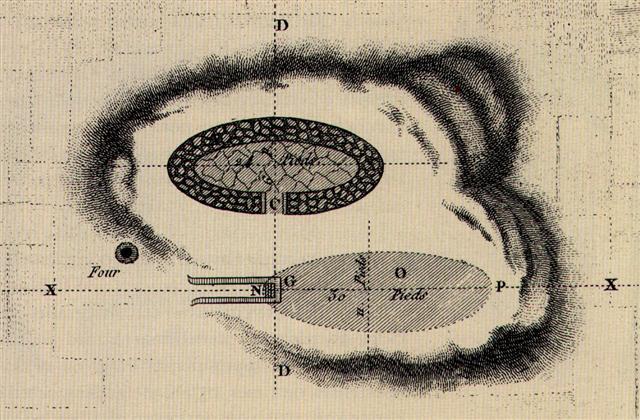
Tupa.
Ancient buildings found scattered along the
coast; made of stone, and almost all of them round, they
served as shelters for fishermen. Tupatupa, to
carry (someone) on a stretcher; to carry (a load) with
the help of several people. Vanaga.1. Land crab. PS
Mgv.: tutupa, a large crayfish. Mq., Ta.: tupa,
land crab. Sa., To., Fu.: tupa, a land crab with
large claws. 2. Mixture, to carry, tupatupa, to
bring in one dead or wounded. Tupapaku, corpse. T
Pau.: tupapaku, corpse, ghost. Mgv.: tupapaku,
corpse, sick person. Mq.: tupapaku, tupapaú,
id. Ta.: tupapau, corpse, ghost, specter.
Churchill. KUPA, v. Haw., to dig out,
hollow out, as a canoe or a trench; kupa-paku, a
place deep down in the ground. Tah., tupa, to dig
out, hollow out, scoop out. Fiji., cuva, to
stoop, bow down.Mal., kubur, grave, tomb. Sunda.,
tumbuk, a hook, a staple. Sanskr., kûpa, a
well, a pit.; kûpa-kara, a well-digger; kub-ja,
humpbacked, crooked; kumbha, a pot, jar. Benfey
(Sanskr. Dict.) refers the two latter to a lost verb
kubh, with an original signification of 'to be
crooked'. He offers no etymon, however, for kûpa,
well, pit. The Polynesians reconcile the two. The
Sanskrit kûpa finds its kindred in the Hawaiian
and Tahitian kupa, and the Sanskrit kumbha,
ku-ja, and kubh, with a primary sense of
'crooked', refer themselves to the Fijian cuva,
'to stoop, low down', a sense now lost within the
Polynesian dialects proper. Pers., kuftan,
kaftan, to dig, cleave; kuft, kâf,
fissure. Armen., kup, pit, cistern. Greek,
κυπτω, to bend forward,
to stoop down; κυφος,
humpbacked; κυμβη,
a cup, a boat, a wallet; σκυφος,
a cup; κυψελη,
any hollow vessel. Lat., cubo, lie,
recline: concumbo, incumbo; cupa, a
vat, cask. Goth., kumbjan, lie down, recline;
hups, the hips, loins. A.-Sax., cop, a hollow
vessel, cup. Anc. Slav., kâpona, a goblet.
Russ., kopati, to dig; a cistern. Welsh, cwb
or cwpan, a hollow place, kennel or cote. Gael.,
tubag, tub. Fornander. Compare also the type of
structure, mainly in the Lake Titicaca basin area,
called chullpa and Easter Island's tupa,
both apparently built as 'adoratorios', in which
mummies, skeletons, and skulls were displayed and
worshipped … where tupa would be the expected
Polynesian revaluation of chullpa. Schumacher. |
| Hâgai. To feed.
Poki hâgai, adopted child. Vanaga. To feed, to
nourish, foster-parent (agai); hagai ei u,
to suckle. P Pau.: fagai, to feed, to maintain,
to support. Mgv.: agai, to nurse, to nurture, to
give food to, an adoptive or foster father; akaagai,
to feed. Mq.: hakai, to feed. Ta.: faaai,
to nourish, a foster-parent. Churchill. |
| te
tuura.o Tuu maheke.ko Rovi.tumuteka
(sic!).te tao. |
The servant (tuura)
of Tuu Maheke, namely Rovi [te
tuura.o Tuu maheke.ko Rovi], prepared the
food for Tuu Maheke [he
hangai i a Tuu maheke]. Tuu Maheke stayed in
Hare Tupa Tuu because of this servant, Rovi.
The earth-oven, the lighting of fire (tumuteka;
emulation te umu te ka), and the cooking (te
tao) were the responsibilities of Rovi.When it was
time to place (the food) into the earth-oven, to take
out (the prepared food), and to take (the meal into the
house) to the king, to Tuu Maheke, only Rovi was allowed
to be there. He alone could supply the king, Tuu Maheke,
with food. |
| a Rovi
ana te apa.mai i te umu.te
mau mai.te hakauru. |
| ki te
ariki.kia Tuu maheke.ai ka noho.no a Rovi.ka hangai |
| no.i te
ariki i a Tuu maheke.ku ravaa ro a i. te tau.o te |
| Ura, lobster. Ûra,
flame, blaze (ûra ahi), to become furious (with
manava as subject: ku-ûra-á te manava).
Úraúra, bright red. Vanaga. 1. Crayfish, lobster,
prawn. P Mgv.: ura, crayfish. Mq.: uá,
lobster. Ta.: oura, crayfish, lobster. 2. Fire,
burning, to be in flames; uraga, combustion,
flame, torch; hakaura, to cause to glow, to
kindle, to light. P Mgv., Ta.: ura, a flame, to
burn. Mq: uá, id. Uraga, burden, load,
weight. Uraura, vermilion, scarlet. P Pau.:
kurakura, red. Mgv.: uraura, an inflamed
countenance. Mq.: uáuá, red, ruddy. Ta.:
uraura, red. Churchill.
Tumu. 1.
Tree trunk. 2. Ancestors: tumu matu'á, parents;
tumu tupuna, grandparents. By extension: tumu
taína, members of friendly families. 3. Como término
muy especial se usa tumu para se¤alar a familias
o personas que no son parientes, de modo que sus hijos
podían, según antigua usanza, casarse entre ellos y
formar un nuevo tronco. 4. Origin of something;
initiator of an idea; person who is the cause of a
fight: tumu taûa. 5. He-kore te tumu, to
be so weakened that you cannot stand (lit.: the trunk is
lacking). Vanaga. Base, cause, element, origin,
principle, source, spring, trunk, occasion, author,
subject, motive; ina e tumu, accidental,
fortuitous; tumu kore, causeless, baseless, weak
in the legs, to waver; tumu o te hakareka, toy;
tumu hatihati, weak in the legs; tumu o te
hiriga, purpose of the voyage. T Pau.: fakatumu,
to lay a foundation. Mgv., Mq., Ta.: tumu, cause,
base, origin, principle, trunk. Tumumeika (tumu
- meika), banana plant. Mgv., Mq.: tumumeika,
id. Churchill.
Teka. Tekai,
curl, a round ball, as of twine. (Tekateka)
hakatekateka, rudder, helm. Churchill. Routledge's
informants still knew the names of the immigrant canoes
(RM:278); they were given as 'Oteka' and 'Oua'.
One Rongorongo text shows ua as the term
used for two canoes, while RR:76 [Barthel's no. 76,
GD111] (phallus grapheme ure, used in this case
for an old synonym teka; compare TUA. teka
'penis of a turtle', HAW. ke'a 'virile male')
tends to confirm the oral tradition with a
transpositional variant (Barthel 1962:134). Barthel 2.
Pau. teka, arrow. Ta.: tea, id. Mq.:
teka, a game with darts. Sa.: te'a, id. Ma.:
teka, id. Churchill. Mgv. teka, a support,
scaffold. Ta.: tea, the horizontal balk of a
palisade, the crossbeam of a house. Mq.: tekateka,
across, athwart. Ha.: kea, a cross. Churchill.
65 - ono tekau ma rima illustrates how in the
Maori dialect tekau stands for 10. Harawira.
Hapai. 1. To handle delicately, carefully;
he hapai i te poki, to pick up, a baby; ka hapai
mai i te kai nei, pass me this food here (wrapped in
banana leaves). 2. To lift (one's feet when running):
he hapai te va'e. Vanaga. To lift, to raise, to
elevate, to embark, to carry, to transport, to offer, to
accept, to transmit; hapai ki ruga, to load, to
raise, to extract, to exhaust; hapai koona ke, to
transfer, to remove; hapai rogo, to announce;
hapaiaga, elevation, to raise; hapaihaga,
burden, offering, assumption; hapaihakahoua, to
report; hapaitari, to import. P Pau: hapai,
to lift up, to raise. Mgv.: apai, apapai,
aapai, to carry, to bear. Mq.: hapai, to
lift, to raise, to take away, to displace. Ta.: apai,
to bring; hapoi, hopoi, to transport.
Churchill. |
| ariki o
Tuu maheke.etahi te kauatu marima. |
In this manner Tuu Maheke had reached
(the age of) fifteen. |
| he ea a
Rovi.he too i te here.he
mau he oho.ki tai.here. |
Rovi took the eel trap. He
picked it up and went to the sea to catch eel, which
were supposed to be a side dish (inaki) for King
Tuu Maheke's sweet potatoes [te
kumara.o te ariki.a Tuu maheke]. |
| hai
koreha.mo i(n)aki o te
kumara.o te ariki.a Tuu maheke. |
| Here. 1. To catch
eels in a snare of sliding knots; pole used in this
manner of fishing, with a perforation for the line. 2.
To tie, to fasten, to lash; rasp made of a piece of
obsidian with one rough side; cable, tie; figuratively:
pact, treatise. Vanaga. 1. To lash, to belay, to knot
the end of a cord, to lace, to tie, to fasten, to knot;
to catch in a noose, to strangle, to garrote; here
pepe, to saddle; moa herea, a trussed fowl;
hehere, collar, necklet; herega, bond,
ligament; heregao, scarf, cravat. 2. Hakahere.
To buy, to sell, to barter, to part with, to pay for, to
do business, to compensate, to owe, to disburse, to
expiate, to indemnify, to rent out, to hire, to traffic,
to bargain, to bribe; merchant, trader, business,
revenge; tagata hakahere, merchant, trader;
hakahere ki te ika, to avenge; hakaherega,
ransom, redemption; hakahererua, to exchange, to
avenge. 3. Here ei hoiho, incense. Churchill.
Hereke, festering wound, cracked skin. Barthel 2.
Koreha. 1. Sea eel; several sorts are
distinguished: koreha puhi. haoko, migo, tapatea.
2. Koreha o raro o te oone, earthworm; koreha
henua, snake. Vanaga. Eel, worm; koreha heenua,
worm. Churchill. |
| he noho
he here.ku hinihini ana.a Rovi.i te herehanga i te |
He stayed there and went about catching
eels. |
| koreha.
ku po.remo ana te ariki.a Tuu maheke.i te noho.hanga |
But Rovi stayed late
catching eels, and Tuu Maheke became hungry while he
waited all by himself. Night came, and King Tuu Maheke
remained without food. |
| no.ko te
po ana.kai kai te ariki.a Tuu maheke. |
|
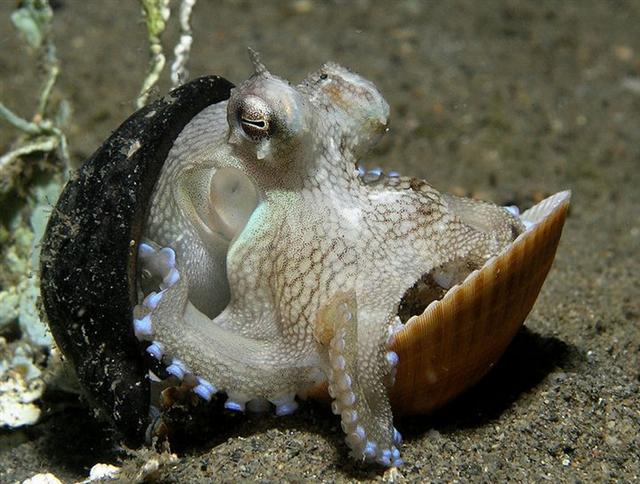 |
|
E:93
(→ 363 - 270) |
| i
po remo era te ariki. a Tuu
maheke.he noho- |
When King Tu Maheke grew
hungry, he sat down inside the house and cried [he
noho-he tangi.i roto i te hare.tupa tuu].
He was all alone [hokotahi]
in Hare Tupa Tuu because [no]
the mother (too) had gone away to dig up sweet potatoes
[te matua tamatahine.ku
oho ana ki te kumara are], and cook them in
the earth-oven [mo tao],
and roast them, and bring them to the king. |
| he
tangi.i roto i te hare.tupa
tuu.hokotahi |
| no.te
matua tamatahine.ku oho ana ki te kumara |
|
are.mo tao.mo
taomi.tokoa.mo
hakauru.ki te ariki |
|
Poremo.
Abstinence. Churchill.
Tagi. To cry, to weep, to moan; tatagi,
to cry much; to cry loudly: he-tagi te karaga; tagata
rava, tagi karaga, bawling, vociferous person.
Vanaga. To cry, to bark, to mew, to bawl, to whine, to
ring, to wail, to prattle, to weep, lamentation,
condolence, to regret, to affect, to wish, to will, to
choose, earnestness; tae tagi, inhuman,
insensible, to refuse, to renounce; tagi kiukiu,
ring of a bell; tagi rakerake, to wish one
ill; tagi kore, indifferent; manava tagi,
to affect; hakatagi, to cause to weep, to make
resound, to ring; tagitagi, to covet; tatagi,
cry mourning, grief, lamentation, to groan, to weep, to
be affected, to grow tender; tatagi tahaga,
inconsolable; tatagihaga, friendship. Churchill.
Are. To dig out (e.g. sweet potatoes).
Formerly this term only applied to women, speaking of
men one said keri, which term is used nowadays
for both sexes, e.g. he-keri i te kumara, he digs
out sweet potatoes. Vanaga. To dig, to excavate.
Churchill. Kumara and komari were both
female in sense.
Taomi.
Mgv.: to squeeze, to press down. Sa.: taomi, to
press down. Ha.: kaomi, to press, to squeeze.
Churchill.
Hakauru, to thread, to inclose, to admit, to
drive in, to graft, to introduce, penetrate, to
vaccinate, to recruit. Akauru, to calk.
Hakahuru, to set a tenon into the mortise, to dowel.
Hakauruuru, to interlace; hakauruuru mai te
vae, to hurry to. 2. To clothe, to dress, to put on
shoes, a crown. Hakauru, to put on shoes, to
crown, to bend sails, a ring. 3. Festival, to feast. 4.
To spread out the stones of an oven. Uruuru, to
expand a green basket. 5. Manu uru, kite.
Uruga (uru 1). Entrance. Churchill. |
| he tikea
te tanginga.o Tuu maheke.e Hotu.ku tangi |
Hotu saw Tuu Maheke's
weeping [he tikea te
tanginga.o Tuu maheke.e Hotu]. When the royal
child (ariki poki) continued to cry [ku
tangi mai era ana.te ariki poki], the father
became angry because of the continued lamentation of
King Tuu Maheke [i te
tangihanga no atu.o te ariki.o Tuu maheke]. |
| mai era
ana.te ariki poki.ku eete
ana te koko(-) |
|
ma.o
tou tangata.matua era.i te tangihanga no a(-) |
| Manava eete, to
shudder, to tremble, to astonish; anger, fright,
consternation; manava eete ki te mau mea
ananake, susceptible; eete manava, affected,
moved. Churchill.
Kokoma. Intestines, guts. Vanaga. Bowels,
entrails, intestines, rectum, garbage, rage, angry;
kokoma hanohano, spite, to despise, to hate,
to storm, to bear a grudge, vexation; kokoma hanohano
ke, to be in a rage; kokoma hakahanohano, to
excite anger; kokoma hanohano manava pohi, to
abhor; kokoma ritarita, to abhor; kokoma eete,
to abhor, to detest, to be in a rage, angry,
ungovernable; tagata kokoma eete, adversary;
kokoma hurihuri, animosity, spite, wrath, fury,
hate, enmity, to pester, to resent, irritable, offended,
hot tempered; kokoma hurihuri ke, to be in a
rage. Churchill.
Tou. In ancient times, a tou was
someone who had recovered from an epidemic, but whose
illness meant that someone else in the family had to
die. The tou were regarded as portents of evil.
Toutou, lush; fertile (land). Toûa: Egg
yolk; the colour yellow; soft, fibrous part of tree
bark; toûa mahute, mahute fibres. Vanaga. Toua:
Wrath, anger, rage, revenge, battle, combat, debate,
dispute, dissension, uprising, revolt, quarrel, fight,
hostility (taua); toua rae, to provoke,
rae toua, to open hostilities, toua kakai, to
rebuke, tuki toua, to stir up dissension;
totoua, hostility; hakatoua, fighter,
warrior. P Mgv.: toua, war, battle. Mq.: toua,
war, dispute, quarrel. The form with o is found
only in these three languages, taua is found in
the general migration, Rapanui is the only speech which
has both. Toutou, fertile (tautau);
hakatoutou, to fertilize. Mq.: taútaú,
fertile. Toùvae, to run; hakauruuru
toùvae, id. Churchill. |
| tu.o te
ariki.o Tuu maheke.he ea.mai.te ariki. |
King Hotu arose [he
ea.mai.te ariki.a Hotu] and went from his
house to the front of the house of Tuu Maheke, which was
a distance away [he
oho.mai mai toona hare.ki mua ki te hare.o Tuu maheke]. |
| a
Hotu.he oho.mai mai toona hare.ki mua ki |
| te
hare.o Tuu maheke.i konui ana i noho mai ai |
|
Four lines of Easter Island script of unknown origin. (The
Eighth Land, p. 290.) |
|
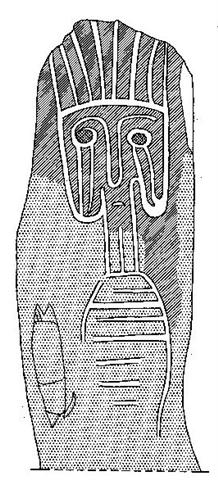 |
|
E:94 |
| i ui mai
ai.ki te tangihanga o Tuu maheke.he rangi |
After he had waited there
and observed the weeping [i
ui mai ai.ki te tangihanga] of Tuu Maheke,
the father called out [he
rangi] the following, while the child
continued to cry [e
tangi era te poki], 'Be still [ka
mou], you bastard (morore), you
crybaby rava tangi) day after day [te
raa.te raa]! One could loose one's eyebrows
(i.e., one gets a headache) from this eternal crying
morning after morning (? apo apo apo)!' |
| mai tau
tangata matua era. e tangi era te poki.penei ē. |
| ka
mou tau morore.ravatangi.te
raa.te raa.ku mo- |
| tu.mai
ana te hihi.i te tanghanga no.apo
apo apo. |
|
Mou. 1. Enough (moua,
mouga). PS Sa.: mou, many. 2. To get (mau);
hakamou, id. 3. To use up, to expand, to absorb;
hakamou, to spend; hakamoumou, to use up,
to expend. 4. To be silent, shy, dejected, stupid,
taciturn, mute, uncomplaining, silence, shut up!,
attention!; mou no, to speak in laconic terms,
dull, mute, silence; hakamou, to silence, to shut
up, to quiet. Mq.: mou, peace, tranquil, quiet.
5. To cease, to end, to finish, to conclude; a pact,
agreement; mou noa, to endure (mau);
mou a te toua, reconciliation; ina kai mou,
always, eternal, perpetual; ina e ko mou,
incessant; e ko mou, always; tae mou,
permanent, perpetual; hakamou, to accomplish, to
end, to conclude, to consummate, to conciliate; e ko
moumou, indissoluble; hakamoumouga, the
finish, termination, Mgv.: mou, to quench the
thirst. 6. To harass; mou no, to suffer damage;
hakamou, to abolish, abrogate, annihilate,
nullify, annul, impoverish, destroy, interrupt,
exsterminate, plunder, smooth out folds; moumou,
to devastate, pillage, devastation, destruction;
hakamoumou, to demolish, to ravage, to suppress.
Ta.: mou, to extinguish, to destroy. Moua,
enough, past (mou, mouga). Churchill.
Kapo. Mgv.: to catch in the hands. Mq.:
kapo, id. Ma.: kapo, id. Churchill. Pau.:
Kapoka, to hollow, to groove. Mgv.: akapoka,
to break with a stone. Ta.: apoo, a hole. Ma.:
poka, a hole, to bore. Kapokapo, to throb, to
pulsate. Ha.: apoapo, to throb. Churchill.
Kape. 'Bitter-taro' (Alocasia macrorrhiza).
In 1957 kape was still cultivated in much the
same way as dry taro. It is a type of food to be eaten
during times of famine. According to Fuentes (1960:856),
the tubers had to be kept in the earth-oven for 15 (sic)
days in order to eliminate some of the poisonous
components. Barthel 2. Arum, yam. Churchill.
...
te tau.o te ariki o Tuu
maheke.etahi te kauatu marima ... [= 15,
E:92]
Kapa. Mgv.: a song for the dead, chant. Mq.:
kapa, a heathen song. Mgv.: aka-kapakapa,
an eager desire balked by timidity. Ta.: apaapa,
to flutter the wings. To.: kabakaba, id. Ma.:
kapakapa, to flutter. Churchill. Tu.: Kapakapa,
portion, particle. Ta.: apaapaa, fragment, bit,
chip. Churchill. In Polynesia gliding flight is
expressed by lele, flight on flapping wing by
kapa. In Nuclear Polynesia kapa does not pass
into the wing sense except through the aid of a
composition member kau. In Samoan 'au we
find this to mean a stalk, a handle; in reference to the
body its sense as that of some projecting member is
exhibited in 'aualuma (the 'au in front)
as a very delicate euphemism for the penis. So
'apa'au would mean literally the projecting member
that flaps. Churchill 2. |
| he
ngaroa tau rangihanga mai era.o tau tangata ma- |
Tuu Maheke heard his father
calling, and [? Rather: When the calling out,
rangihanga, of
his father had finished,
he
ngaroa] the
child continued to cry [ka
tangi no te poki]. |
| tu era.e
Tuu maheke.ka tangi no te poki.he ea |
| tau
tangata matua era.he hoki he oho.ki toona |
The father [tangata
matua] got up [he ea], went [rather:
returned] to his house, and stayed there [he
hoki he oho.ki toona hare he noho]. |
| hare he
noho. |
| he tuu
mai tau vie matua era.mai te kuma- |
The mother [vie
matua] came back [he
tuu] from harvesting sweet potatoes [te
kumara keri]. She came at the moment when the
eyes of the king were still swollen from crying.
The mother asked [he
ui] the child, 'What is wrong, oh king, that
you are crying and the eyes of the king are swollen from
crying.' [ku ahuahu ana
te mata o te ariki i te tangihanga] |
| ra
keri.i ka mana mai nei.ko te ariki.ku
a- |
|
hu.ahu ana te mata o te
ariki.i te tangihanga. |
| he
ui.tau vie matua era.heaha.koe e te ariki |
| ē.e
tangi ena koe.ku ahuahu ana
te mata o te a(-) |
| Ahu. 1. Funerary
monument with niches holding the skeletons of the dead.
2. Generic term for a grave, a tomb merely enclosed with
stones. 3. Stone platform, with or without graves. 4.
Elevated seat, throne. 5. Swollen; to swell up:
ku-ahu-á tooku va'e, my foot is swollen; ananake
te raá e-tagi-era te ûka riva mo toona matu'a ka-ahu
ahu-ró te mata, every day the daughter cried for her
parents until her eyes were quite swollen. Vanaga. 1. To
transfer, to transplant, to take up by the roots. 2. To
puff up, to swell, a swelling, protuberance; gutu ahu,
swollen lips; ahuahu, to swell, plump,
elephantiasis, dropsy; ahuahu pupuhi, amplitude;
manava ahuahu, indigestion. 3. Paralysis. 4. A
carved god of dancing, brought forth only on rare
occasions and held of great potency. Ahuahu,
inflammation. Ahukarukaru (ahu 2 -
karukaru), dropsy. Churchill. |
| riki i
te tangihanga.he ki mai tau kope era. |
The boy (kope) answered the
following [he ki mai tau
kope era.penei ē], 'There is this person, and
I am crying because of him. The bad man [tangata
rakerake] ... |
| penei
ē.he mee au e tangi nei.he rangi mai e tau. |
tangata
rakerake ena. (crossed out: he ki mai tau
vie matua era.ina.aana ana.koe i tuki mai ki roto kia āu) |
|
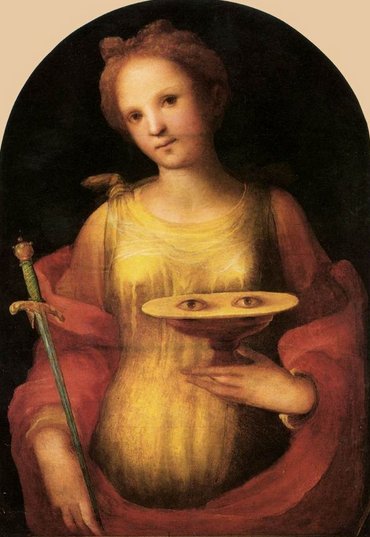 |
|
E:95 |
| penei
ē.ka mou te morore ravatangi.ku
motu a(-) |
shouted [he
rangi] at me (deletion) like this [penei
ē]: 'Be still [ka
mou], you bastard [te
morore], you crybaby [ravatangi]!
One gets a headache [ku
motu ana.te hihi] from your whining [i
te ravatangihanga] day after day [te
raa te raa].' That's how it was [peirā].
After he had shouted at me like this [i
rangi mai ai kia au], he returned to his
house and stayed there [he
hoki atu ki toona hare he noho].' |
| na.te
hihi.i te ravatangihanga. te raa te raa.peirā |
| i rangi
mai ai kia au.he hoki atu ki toona hare |
|
Motu. 1. To cut;
to snap off: motu-á te hau, the fishing line
snapped off; to engrave, to inscribe letters or pictures
in stone or in wood, like the motu mo rogorogo,
inscriptions for recitation in lines called kohau.
2. Islet; some names of islets: Motu Motiro Hiva,
Sala y Gómez; and around the island: Motu Nui, Motu
Iti, Motu Kaokao, Motu Tapu, Motu Marotiri, Motu Kau,
Motu Tavake, Motu Tautara, Motu Ko Hepa Ko Maihori, Motu
Hava. Motu rau uri, southeast wind. Motu
takarua, west wind. Vanaga. To break, to cut with a
knife, to sever, to rupture; rent, reef, shoal, rock;
motu poto, to cut short; aretare motu, an
oratory; motu kivakiva, an uncovered shoal;
motumotu, to cut up; tae motumotu, e ko motumotu,
indissoluble. P Pau.: motu, island; komutu,
to break. Mgv.: motu, an island, a rock, to cut,
to be broken. Mq.: motu, island, land, to break,
to cut up, to take to pieces. Ta.: motu, a low
island, to be broken, cut up. Motuava (motu
- ava 1), a hollowed rock. Motuhaua,
archipelago. Motupiri (motu - piri),
archipelago. Motuputuputu (motu -
putuputu), archipelago. Moturauri, south wind
T. Moturogorogo, to write T. Churchill. H Moku
1. To be cut, severed, amputated, broken in two, as a
rope; broken loose, as a stream after heavy rains, or as
a bound person; to punctuate. Moku ka pawa, dawn
has broken. Kai moku ka noho 'ana, relations
separated by the sea. Ho'o moku, to cut and
divide; a cutting, division, separation. 2. District,
island, islet, section, forest, grove, clump, severed
portion, fragment, cut, laceration, scene in a play.
Cfr. mokupuni, momoku. Moku lehua,
lehua forest. Ho'o moku, to place one over
a moku, district. 3. Ship, schooner, vessel,
boat, said to be so called because the first European
ships suggested islands. 4. A stage of pounded poi
(such poi sticks together as a mass and can be
separated cleanly - moku - from the pounding
board). Wehewehe. Hi. 1. To have a headache
(subject: roro, brain). Ku hí á tooku roro,
I have a headache. 2. to fish; hí-kau, to fish
while swimming. 3. To blow one's nose. Vanaga. 1. To
angle. Mgv.: hi, hipo, to fish with a
line. Mq., Ta.: hi, id. 2. Asthma, to wipe the
nose; hihi, to have a cold. Churchill. |
| he
noho.he ea.tau vie matua era.he oho.he tuu |
The mother got up, went away, arrived,
and lit the earth-oven[he
ea.tau vie matua era.he oho.he tuu he kā i te umu]. |
| he kā i
te umu.he tao(m)i i te kumara.he koko(-) |
She roasted the sweet
potatoes, took a dish, picked up (the meal), came, [he
tao(m)i i te kumara.he kokohu.he mau he oho.mai]
and entered (the house of) King Tuu Maheke from the rear
[he hakauru mai a tua.ki
te ariki.kia Tuu maheke]. |
| hu.he
mau he oho.mai.he hakauru mai a tua. |
| ki te
ariki.kia Tuu maheke.he hoki he oho.he tu(-) |
| u.he
uru
i te umu.he tao.he oti te tao i te umu. |
Then she turned around, arrived, and
placed the food into the earth-oven [he
hoki he oho.he tuu.he uru i te umu]. She
cooked it and finished the cooking in the earth-oven [he
tao.he oti te tao i te umu]. |
| ku oti
ana te umu.a Vakai.te tao.i tuu mai ai |
The earth-oven of Vakai and the cooking
were finished [ku oti
ana te umu.a Vakai.te tao] when the servant
of the king, namely Rovi, arrived [i
tuu mai ai te tuura.o te ariki.ko Rovi]. |
| te
tuura.o te ariki.ko Rovi.he tuu mai ia ki taa(-) |
He went to his earth-oven
and lit it (to be able) to prepare (food) for the king
in it [he tuu mai ia ki
taana.umu.he ka mo hakauru mo te ariki]. |
|
na.umu.he ka mo hakauru mo
te ariki. |
|
Uru. 1. To lavish food on those who have
contributed to the funerary banquet (umu pâpaku)
for a family member (said of the host, hoa pâpaku).
2. To remove the stones which have been heated in the
umu, put meat, sweet potatoes, etc., on top of the
embers, and cover it with those same stones while
red-hot. 3. The wooden tongs used for handling the
red-hot stones of the umu. 4. To enter into (kiroto
ki or just ki), e.g. he-uru kiroto ki te
hare, he-uru ki te hare. 5. To get dressed: kahu
uru. Vanaga. Uruga. Prophetic vision. It is
said that, not long before the first missionaries'
coming a certain Rega Varevare a Te Niu saw their
arrival in a vision and travelled all over the island to
tell it: He-oho-mai ko Rega Varevare a Te Niu mai
Poike, he mimiro i te po ka-variró te kaiga he-kî i
taana uruga, he ragi: 'E-tomo te haûti i Tarakiu, e-tomo
te poepoe hiku regorego, e-tomo te îka ariga koreva,
e-tomo te poporo haha, e-kiu te Atua i te ragi'. I te
otea o te rua raá he-tu'u-hakaou ki Poike; i te ahi
mo-kirokiro he-mate. Rega Varevare, son of Te Niu,
came from Poike, and toured the island
proclaiming his vision: 'A wooden house will arrive at
Tarakiu (near Vaihú), a barge will arrive,
animals will arrive with the faces of eels (i.e.
horses), golden thistles will come, and the Lord will be
heard in heaven'. The next morning he arrived back in
Poike, and in the evening when it was getting dark,
he died. Vanaga. He ui a Ira.ko te motu etoru.he ki a
Ira.he ro korua e kau a repa e ku ketu ana te urunga.a
Hau maka o to tatou matua.i hakahi mai ai kia au.ko nga
kope ririva tutuu vai a te taanga.te ingoa o te motu ena
etoru i nape ai e te kuhane o Hau maka. Ira saw that
there were three such islets. Ira said, 'Hey you, crew
of young men, the vision of Hau Maka, our father, which
he revealed to me, has come true. There are 'the
handsome sons of Te Taanga, who are standing in the
water', for this is the name that the dream soul of Hau
Maka gave them. (E:17) Uru manu. Those who do not
belong to the Miru tribe and who, for that
reason, are held in lesser esteem. Úru-úru. To
catch small fish to use as bait. Uru-uru-hoa.
Intruder, freeloader (person who enters someone else's
house and eats food reserved for another). Vanaga.1. To
enter, to penetrate, to thread, to come into port (huru);
uru noa, to enter deep. Hakauru, to
thread, to inclose, to admit, to drive in, to graft, to
introduce, penetrate, to vaccinate, to recruit.
Akauru, to calk. Hakahuru, to set a tenon
into the mortise, to dowel. Hakauruuru, to
interlace; hakauruuru mai te vae, to hurry to. 2.
To clothe, to dress, to put on shoes, a crown.
Hakauru, to put on shoes, to crown, to bend sails, a
ring. 3. Festival, to feast. 4. To spread out the stones
of an oven. Uruuru, to expand a green basket. 5.
Manu uru, kite. Uruga (uru 1).
Entrance. Churchill. Ta.: uru, the human skull.
Mq.: uu, the head. Sa.: ulu, id. Moriori:
ulu, id. Uru, make even. Kapingamarangi. |
|
Four lines of Easter Island script plus the name
Vaka.a Tea hiva:
= segments from Kr2, Kr3, Kr4, and Kr5 (The Eighth
Land, p. 290.) |
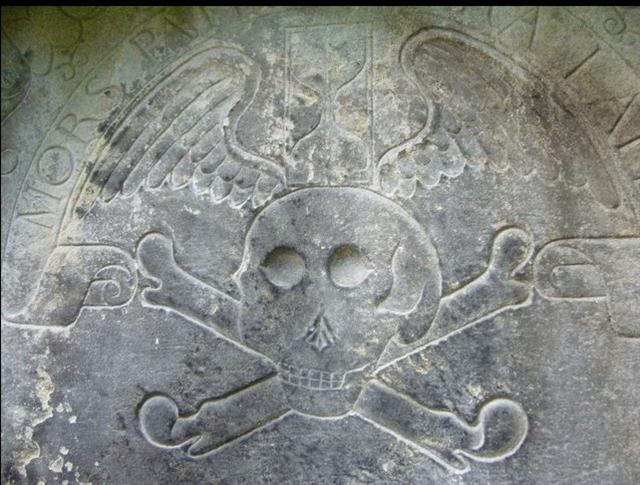
|